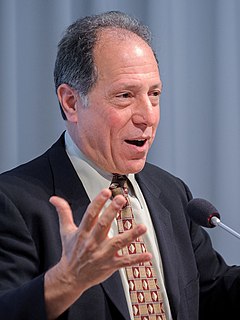A Quote by Peter A. Levine
The effects of unresolved trauma can be devastating. It can affect our habits and outlook on life, leading to addictions and poor decision-making. It can take a toll on our family life and interpersonal relationships. It can trigger real physical pain, symptoms, and disease. And it can lead to a range of self-destructive behaviors.
Quote Topics
Family
Affect
Behaviors
Decision
Decision-Making
Destructive
Destructive Behavior
Devastating
Disease
Effects
Family Life
Habits
Interpersonal
Interpersonal Relationship
Lead
Leading
Life
Making
Our
Our Family
Outlook
Outlook On Life
Pain
Personal Relationships
Physical
Physical Pain
Poor
Range
Real
Relationships
Self
Self-Destructive
Symptoms
Take
Toll
Trauma
Trigger
Unresolved
Related Quotes
Submitting self to God is the only real freedom-because the deepest slavery is self-dependence, self-reliance. When you live your life believing that everything (family, finances, relationships, career) depends primarily on you, you're enslaved to your strengths and weaknesses. You're trying to be your own savior. Freedom comes when we start trusting in God's abilities and wisdom instead of our own. Real life begins when we transfer our trust from our own efforts to the efforts of Christ.
Adopting the behaviors and habits of surrendered people helps us improve our relationships, feel love and gratitude, get healthier, give up destructive people and behavior patterns, and become more successful and influential in our lives and careers. And that's just the tip of the iceberg as far as benefits go.
Giving my life to you may mean leading a very ordinary life or it may mean leading an extraordinary life. It may mean having a family and a career or it may mean going beyond all that to just work for others. It's hard to say. Rather than making a decision myself, I'm going to give my life to you, to do with as you will, because I know that you are my self, you are my very being.
One of the main jobs of conciousness is to keep our life tied together into a coherent story, a self-concept. It does this by generating explanations of behaviors on the basis of our self image, images, memories of the past, expectations of the future, the present social situation, and the physical environment in which behavior is produced.
I believe that Americans are entitled. We're entitled to have a job that makes us feel like we have some dignity in our lives, that we live a life of integrity, and that we have good family relationships and our relationships with our friends and our families and our coworkers are enriching and meaningful.
When we cross the gates of death, our karma is all we take with us. Everything else that we enjoyed in this life we leave behind... Our karma is the only thing that will count in determining our rebirth, for our next life is nothing but the effects of our karmic tendencies that materialize in our perception.
It seems that some consideration should be given to the cause of our mounting physical disabilities, but instead of going to the root of our troubles - wrong habits of eating and drinking - we rush to the medicine shelf and smother our uncomfortable and distressing symptoms under an avalanche of pills, potions and palliatives.
In our culture, many of us idealize love. We see it as some lofty cure-all for all of life's problems. Our movies and our stories and our history all celebrate it as life's ultimate goal, the final solution for all of our pain and struggle. And because we idealize love, we overestimate it. As a result, our relationships pay a price.
Delaying a meal brings about symptoms most people call "hunger." These symptoms include abdominal cramping, weakness, and feeling ill-the same as during drug withdrawal. This is not hunger. Our dietary habits, especially eating animal-protein-rich foods three times a day, are so stressful to the detoxification system in our liver and kidneys that we start to get withdrawal, or detoxification, symptoms the minute we aren't busy processing such food. Real hunger is not that uncomfortable.



































